Drone competitions have strict regulations to guarantee safety and fair play. You must register drones over 0.55 lbs with the FAA, paying a $5 fee, and provide proof of registration, including The Recreational UAS Safety Test certification. Drones are prohibited during events, especially NCAA and UIL contests, to maintain a secure environment for participants. Additionally, comply with local, state, and federal laws governing drone usage. Familiarizing yourself with these guidelines is vital for successful participation. Overall, following these rules not only protects everyone but also enhances the event's integrity and organization, revealing even more essential details about drone operations.
Overview of Drone Regulations
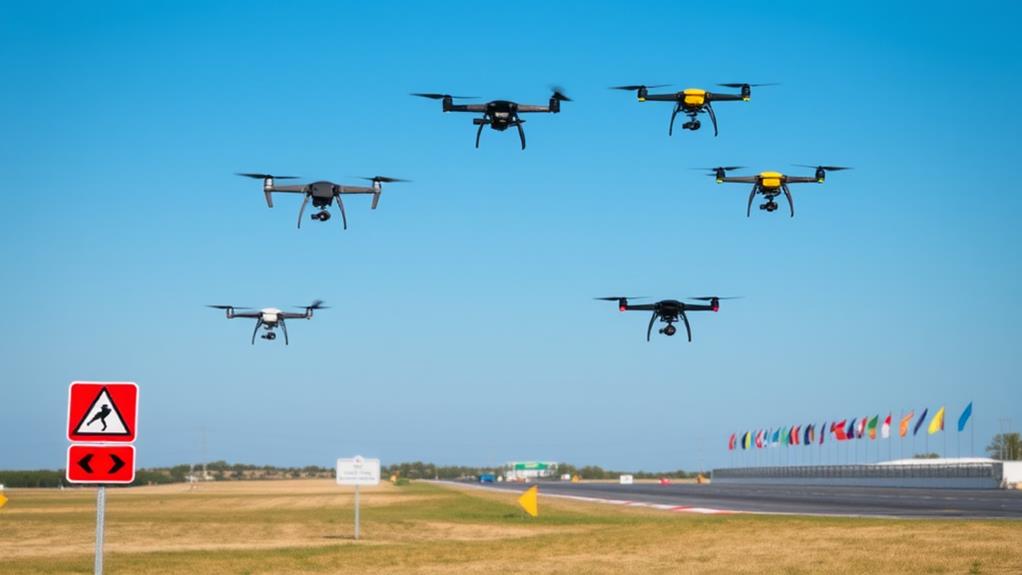
When it comes to drone regulations in competitions, safety is the top priority. You need to understand that drones are prohibited during scrimmages, contests, or games to maintain the safety and integrity of the competition. Organizations like the NCAA and UIL have strict rules against drone usage over the field when teams are present. This includes not only players but also officials and spirit groups. The goal is to prevent any accidents or disruptions that could impact the event.
Additionally, it's vital to guarantee that all drone operators comply with FAA regulations, as these guidelines are essential for promoting safety and accountability in all drone operations.
Moreover, compliance with local, state, and federal laws, including FAA regulations, is mandatory for any drone operation in these settings. While some specific allowances for drone use may exist depending on the contest's playing rules, local discretion often governs activities outside designated areas.
This means that even if you think drone footage could enhance the event, you must follow the established guidelines strictly.
Registration Requirements for Competitions
Understanding the registration requirements is essential for participating in drone competitions. If your drone weighs over 0.55 lbs (250g), you must register it with the FAA before competing. This process involves a $5 registration fee, ensuring your drone meets FAA regulations.
Compliance with local drone laws is vital for safe operation and community trust, as it helps mitigate risks associated with aerial activities safety regulations and risk management. Make sure your registration is current and that the registration number is clearly visible on your drone.
In addition to basic drone registration, compliance with FAA regulations, including Part 107 for commercial operations, is critical. This means you should familiarize yourself with the specific rules set by competition organizers regarding drone usage, as they may have additional requirements.
When attending events, it's essential to carry proof of registration and any necessary certifications, such as The Recreational UAS Safety Test (TRUST). Failing to meet these requirements could disqualify you from participating, so double-check everything before you head out.
Safety Guidelines for Participants
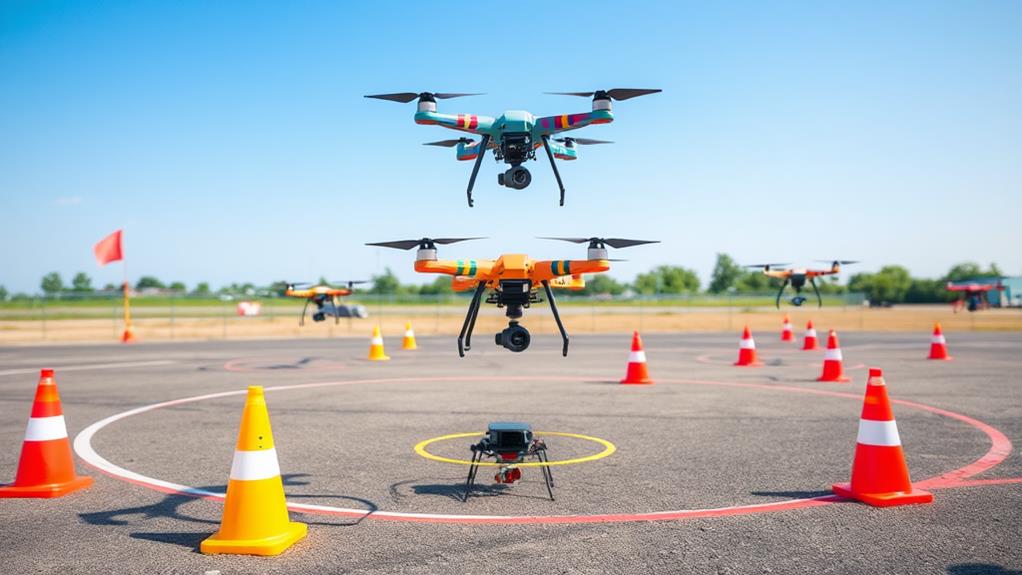
Guaranteeing safety during drone competitions is paramount for all participants involved. To maintain a secure environment, drones are prohibited from being used during scrimmages, contests, or games. This rule protects the integrity of competition and the safety of players and officials.
Compliance with NCAA and UIL regulations is essential; drones mustn't fly over the field when teams are present. Additionally, understanding drone operations and capabilities can help pilots make informed decisions during practice and guarantee safe maneuvers.
When practicing, it's vital to adhere strictly to FAA regulations. This means you need to maintain visual line of sight with your drone and yield to other aircraft, guaranteeing everyone's safety. Be aware that local discretion governs drone activity outside designated areas, so familiarize yourself with the specific venue regulations.
Furthermore, enforcing these drone regulations prioritizes the well-being of athletes, officials, and spectators during competitions. Always stay informed about your responsibilities as a participant.
Following these safety guidelines not only safeguards you but also enhances the overall experience for everyone involved. Remember, the goal is to enjoy the thrill of competition while keeping safety at the forefront. By respecting these rules, you contribute to a safe and fair environment for all.
Local and State Regulations
When you're preparing for a drone competition, it's essential to understand local and state regulations that could affect your operation.
In Texas, local municipalities can impose their own restrictions, and you must consult these rules to avoid penalties.
Additionally, state laws like those in the Texas Government Code Chapter 423 outline what's permissible, ensuring you comply with all necessary regulations for safe and lawful drone use.
Local Drone Restrictions
Maneuvering local drone restrictions is vital for pilots participating in competitions. Local municipalities in Texas, for instance, may impose additional regulations that could restrict drone operations during special events. It's important to check local laws for specifics, as local authorities have discretion in regulating drone activity, which can vary widely from one area to another.
For example, the University Interscholastic League (UIL) prohibits drone usage over the stadium footprint when teams are present, prioritizing the safety of all participants involved in competitions.
Additionally, state regulations like HB 1424 (2017) ban drone operation over correctional facilities and sports venues, unless specific conditions are met.
Adhering to local drone restrictions isn't just about following the rules; it's about maintaining the integrity of the event. If you fail to comply with these regulations, you risk facing enforcement actions that could disrupt the competition.
State Law Compliance
Maneuvering the complexities of both local and state regulations is important for drone pilots engaged in competitions. In Texas, for instance, the Government Code Chapter 423 governs unmanned aircraft, defining permissible uses and outlining offenses related to drone operation during competitions. This means you'll need to understand what's allowed and what's not, especially when flying your drone within specific areas.
Local municipalities may impose additional regulations, so it's vital to check local laws before taking to the skies. For example, the University Interscholastic League (UIL) explicitly prohibits drone operation over the stadium footprint when teams are present, prioritizing the safety of all participants.
State law compliance isn't just about knowing the rules; it's about adhering to them. Non-compliance can lead to legal consequences, making it necessary for you to stay informed about current regulations, as these laws can change frequently.
Always verify the latest requirements to confirm your drone operations during competitions are lawful and safe. By doing so, you can enjoy your experience without the worry of legal repercussions.
Federal Aviation Administration (FAA) Rules
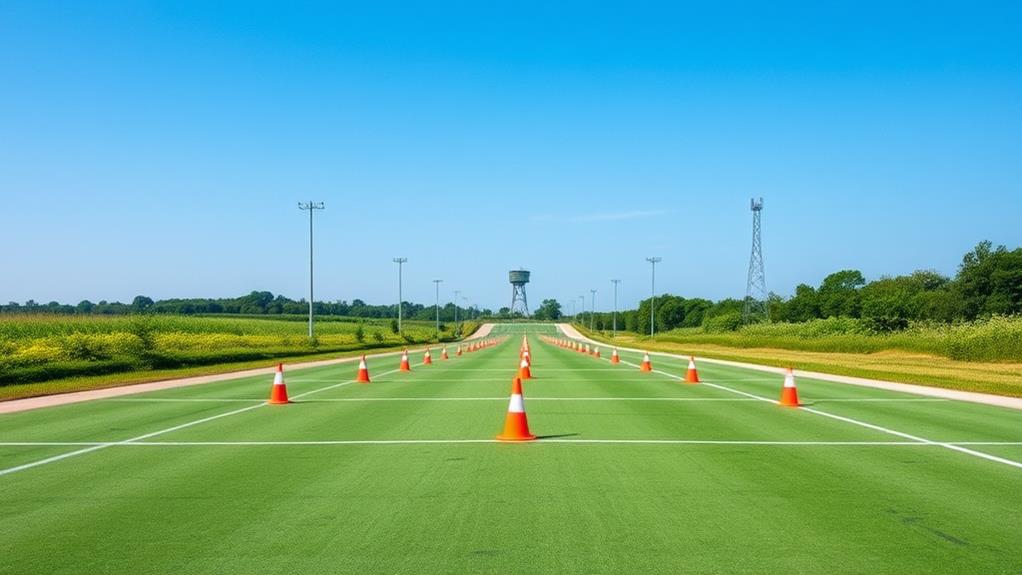
Before entering any competition, you need to make sure your drone is registered with the FAA if it weighs over 0.55 pounds.
Compliance with local laws is essential, as these regulations can vary and may add extra restrictions on your drone use.
Understanding these federal rules will help you operate safely and effectively in competitive settings.
Registration Requirements
When it comes to drone competitions, you need to get your registration sorted out to comply with FAA rules. If your drone weighs over 0.55 pounds, you must register it with the FAA before you take to the skies. The registration fee is just $5, making it a small investment for flying legally. You can complete this process online through the FAA's official site, DroneZone. Just log in using your email associated with your account.
All drone pilots, whether flying recreationally or commercially, must adhere to the registration requirements outlined in 14 CFR Part 107.
If you're a recreational pilot, don't forget that you also need to take The Recreational UAS Safety Test (TRUST) and carry proof of passage while flying. Additionally, you must display your registration number visibly on your drone to guarantee compliance with FAA regulations.
Compliance With Local Laws
Understanding compliance with local laws is essential for drone operators participating in competitions. When you plan to fly your drone, you must follow the FAA's regulations. For starters, if your drone weighs over 0.55 pounds, it needs to be registered. Additionally, if you're using it for commercial purposes, you have to operate under Part 107 guidelines. This means following specific operational rules, which are critical for keeping the competition safe and fair.
Moreover, you should be aware that local municipalities may have their own drone restrictions. These laws can directly impact your ability to fly near competition venues, so it's important to check them before you take off.
For recreational use, the FAA mandates that you follow Community Based Organization guidelines and keep your drone within visual line of sight.
If you're flying in controlled airspace, don't forget that you'll need prior FAA authorization. This step is essential for ensuring that your drone operations are safe, especially when other teams and spectators are present.
NCAA Drone Policies
Drone regulations in NCAA competitions are designed to prioritize player safety and maintain the integrity of the game. The NCAA strictly prohibits the use of drones over the field while teams are present, guaranteeing compliance with safety standards.
Drone activity isn't allowed within team areas during active play, and enforcement is managed by game officials or conference policies. This means that if you're involved in drone operations at an NCAA event, you need to be aware of these restrictions.
Additionally, compliance with federal, state, and local laws is mandatory for all drone operations. This guarantees that any drone usage adheres to the legal requirements governing airspace and safety.
You should also consider that campus policies may impose further restrictions on where and when drones can be flown, adding another layer of compliance to follow.
Ultimately, the presence of drones at NCAA events is carefully controlled. This control not only protects the participants but also helps maintain the integrity of the competition.
Understanding these regulations is essential if you're looking to operate drones in a college sports environment.
UIL Restrictions on Drones
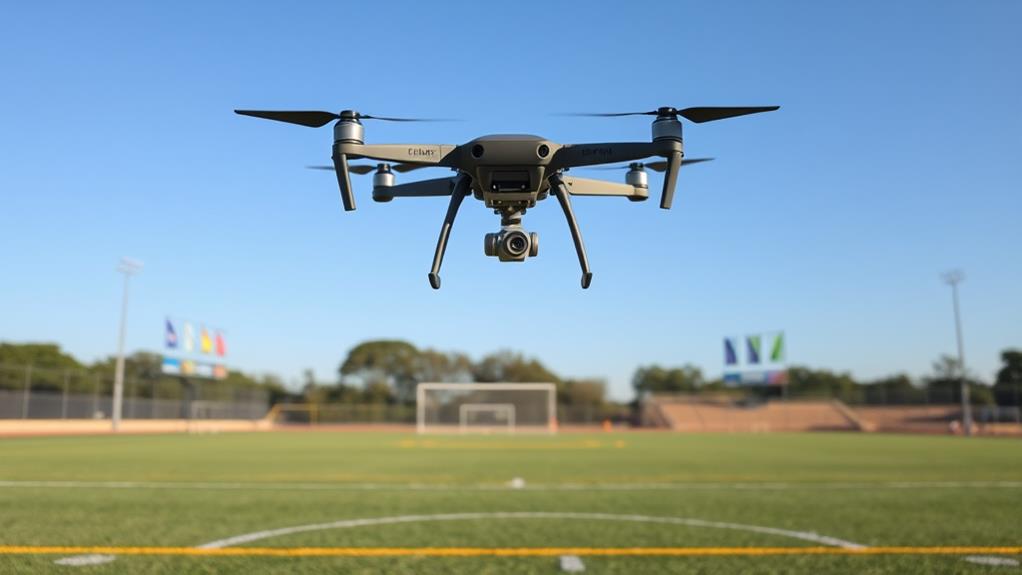
In UIL competitions, the use of drones over the stadium footprint is strictly prohibited as long as any team is present, ensuring the safety of all participants involved. This restriction is designed to prioritize participant safety and maintain the integrity of the event.
It's not just the teams that are affected; officials, bands, and spirit groups must also adhere to these rules when attending UIL events.
When it comes to UAS, or Unmanned Aircraft Systems, the regulations are clear. Game management or conference policy dictates any permissible use of drones.
If you're considering using drones for filming or photography, remember that all drone usage must comply with federal, state, and local laws. Be aware that local municipalities may impose additional restrictions, which means it's essential for event organizers to stay informed about these rules.
Best Practices for Compliance
Compliance with drone regulations during competitions is essential for guaranteeing safety and maintaining the integrity of the event. To achieve this, you should first familiarize yourself with the NCAA, UIL, and local regulations that prohibit flying drones over competition fields when teams are present or during active play.
Always obtain the necessary permissions and follow specific game management policies before operating drones during practice sessions.
Next, make certain you understand federal, state, and local drone laws to avoid any violations that could compromise event safety and integrity. Regularly reviewing updates on drone policies from governing bodies helps you stay informed about any changes that may affect compliance during competitions.
Additionally, maintain a clear understanding of designated areas for drone usage outside competition times to respect local regulations and discretion.
If you're new to drone flying, completing a UAS Safety Test can be beneficial. This guarantees you're equipped with the knowledge necessary for responsible operation.
Impact of Drone Regulations on Competitions
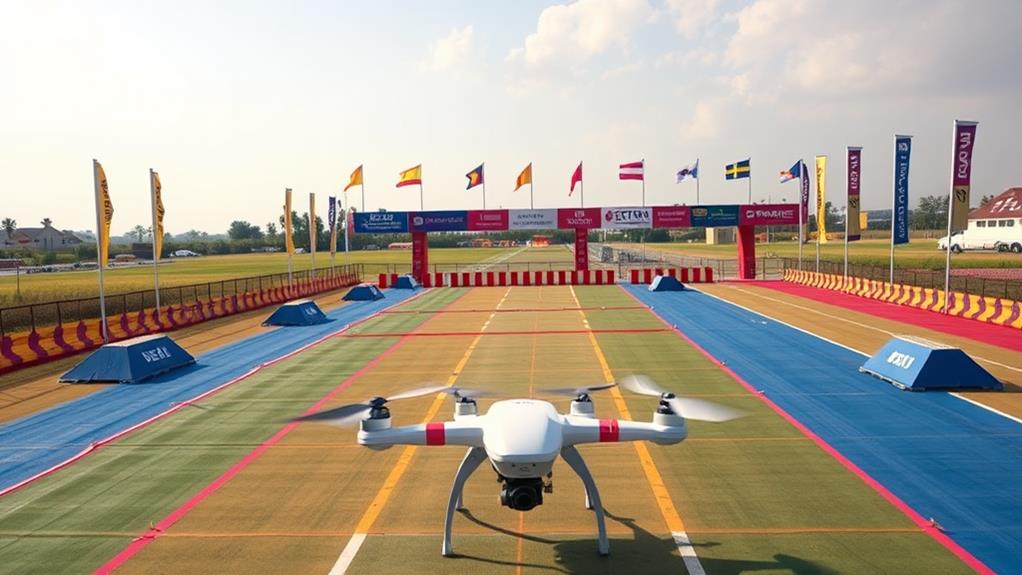
When you consider the impact of drone regulations on competitions, safety for participants stands out as a top priority.
By prohibiting drones over active play areas, these rules help maintain a distraction-free environment that supports fair play and athlete focus.
Plus, compliance with regulatory bodies guarantees that all events run smoothly, protecting both the integrity of the competition and the well-being of everyone involved.
Safety Considerations for Participants
Drone regulations play an essential role in ensuring the safety of all participants during competitions. By following these regulations, you contribute to a secure environment for players, officials, and spectators alike.
Here are some key safety considerations to keep in mind:
- No Drones Over Fields: Drone usage is strictly prohibited over competition fields when teams are present to prevent potential collisions or distractions.
- Compliance with Regulations: Adhering to NCAA and UIL regulations helps minimize risks and maintains the integrity of the event.
- Local Discretion: Event organizers have the authority to govern drone activity outside designated areas, prioritizing participant safety based on the specific situation.
- Monitoring Operations: Continuous monitoring of drone operations is essential to uphold safety standards and prevent interference with teams and officials.
Moreover, participating in the UAS Safety Test (TRUST) can further enhance your understanding of drone safety, ensuring that everyone is well-informed.
Compliance With Regulatory Bodies
Managing the complexities of drone regulations is vital for guaranteeing a smooth and safe competition experience. You need to be aware that organizations like the NCAA and UIL impose strict rules regarding drone usage during competitions.
The NCAA specifically prohibits drones from flying over the field when teams are present, ensuring compliance with both federal and local regulations. Similarly, UIL regulations extend to all participants, including officials and bands, prohibiting drone operation within the stadium during active play.
Understanding local discretion is also important. While some areas may allow drone activity outside designated zones, you must adhere to local policies and regulations to avoid complications. Violating these drone regulations can lead to serious enforcement actions from regulatory bodies, which can impact not just the integrity of the event but also the overall safety of everyone involved.
To maintain compliance with regulatory bodies, stay informed about the specific rules that apply to your competition.
Whether you're an organizer, participant, or spectator, knowing these regulations will help create a more enjoyable and secure environment for all. Always prioritize safety and compliance to guarantee the best experience at drone competitions.
Resources for Drone Pilots
As you navigate the world of drone flying, it's crucial to tap into the available resources that keep you informed and compliant with regulations. Here are some key resources every drone pilot should utilize:
- DroneZone: The FAA's official registration site helps you register drones over 0.55 lbs and renew expired registrations.
- Recreational UAS Safety Test (TRUST): This test is important for hobbyists to guarantee safe flying practices and compliance with regulations.
- B4UFLY Mobile App: Use this app for flight planning, checking airspace restrictions, and identifying no-fly zones.
- Know Before You Fly: This campaign offers educational resources and guidelines to promote safe UAS operation, stressing adherence to local and federal laws.
Additionally, if you have specific questions or need more information on drone regulations, you can reach out to the FAA at [email protected].
Conclusion
In the world of drone competitions, knowing the regulations isn't just helpful—it's essential. Imagine soaring through the skies only to be greeted by a swarm of regulators wielding clipboards instead of trophies. By familiarizing yourself with registration, safety guidelines, and local rules, you can avoid becoming a cautionary tale. Stay informed, follow the guidelines, and you'll not only enjoy the thrill of competition but also keep the skies friendly and safe. So, gear up and fly smart!
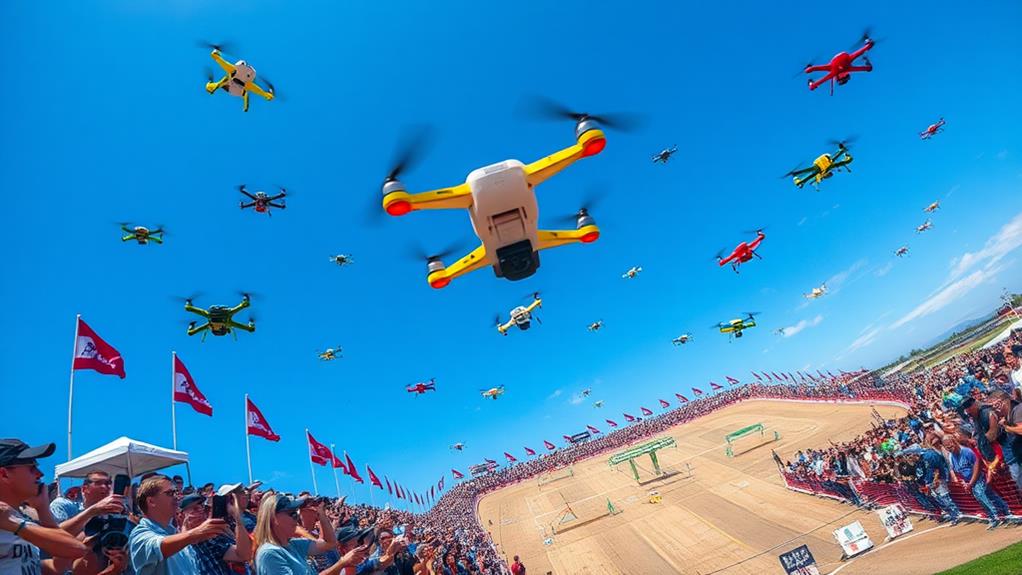
Leave a Reply